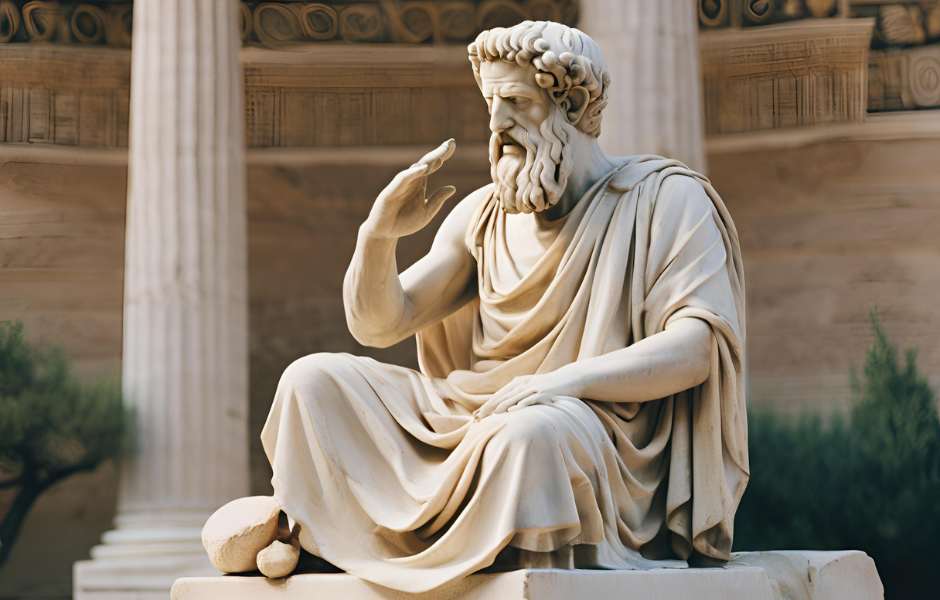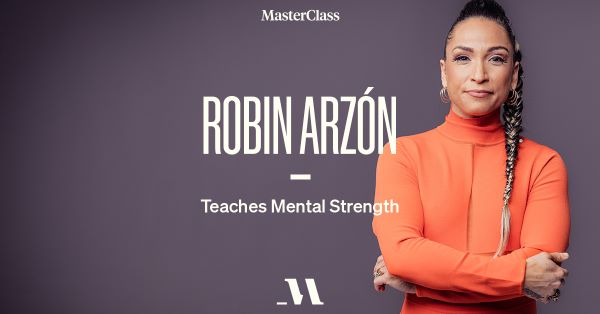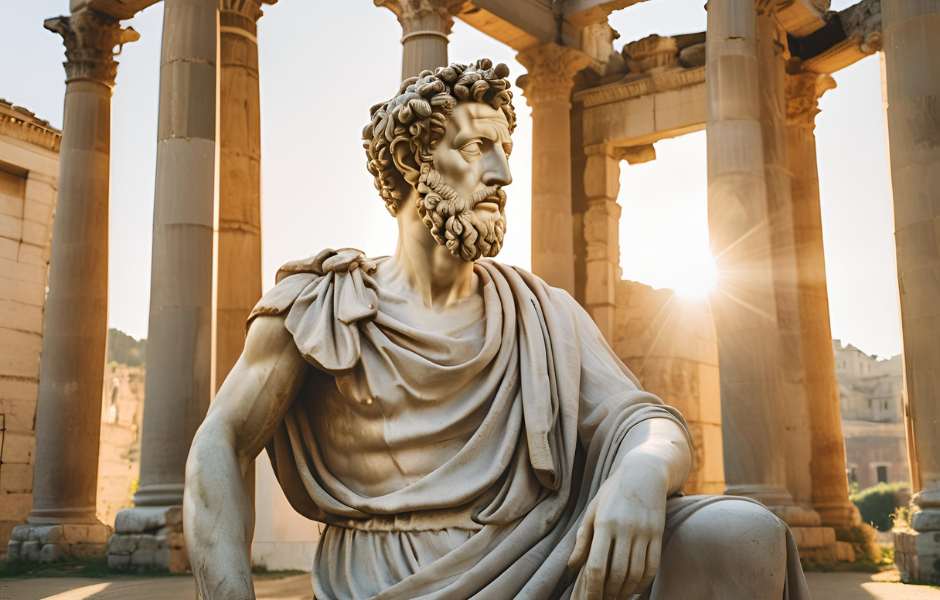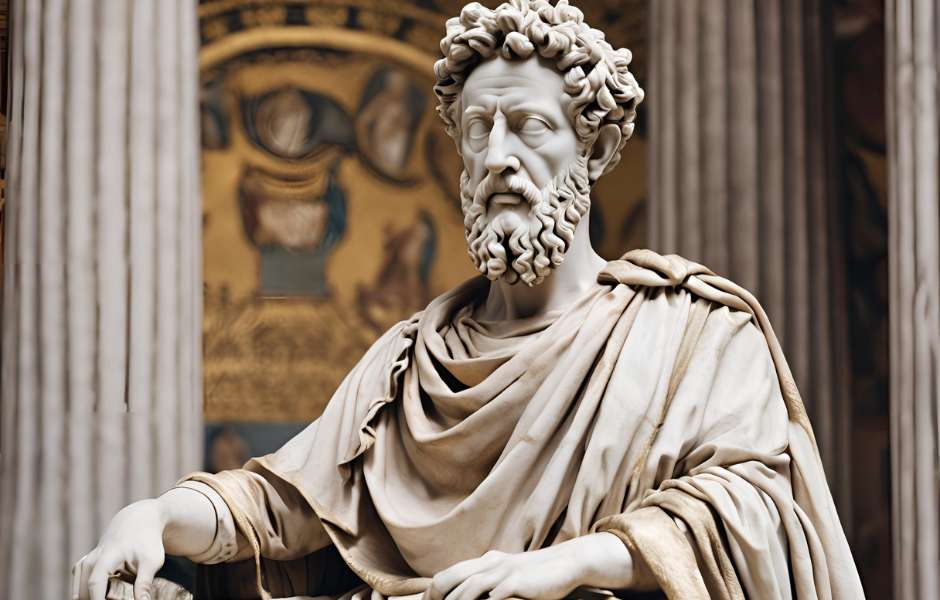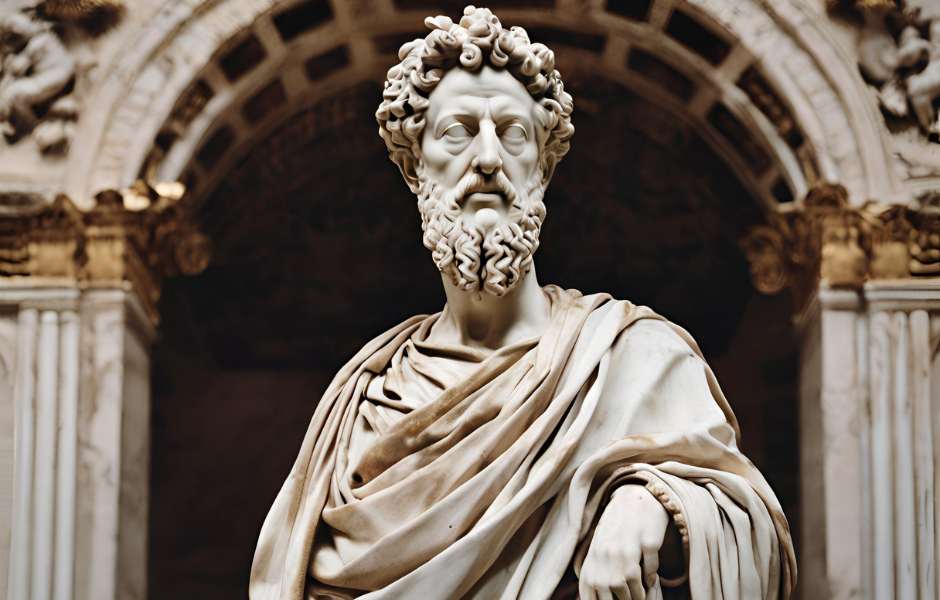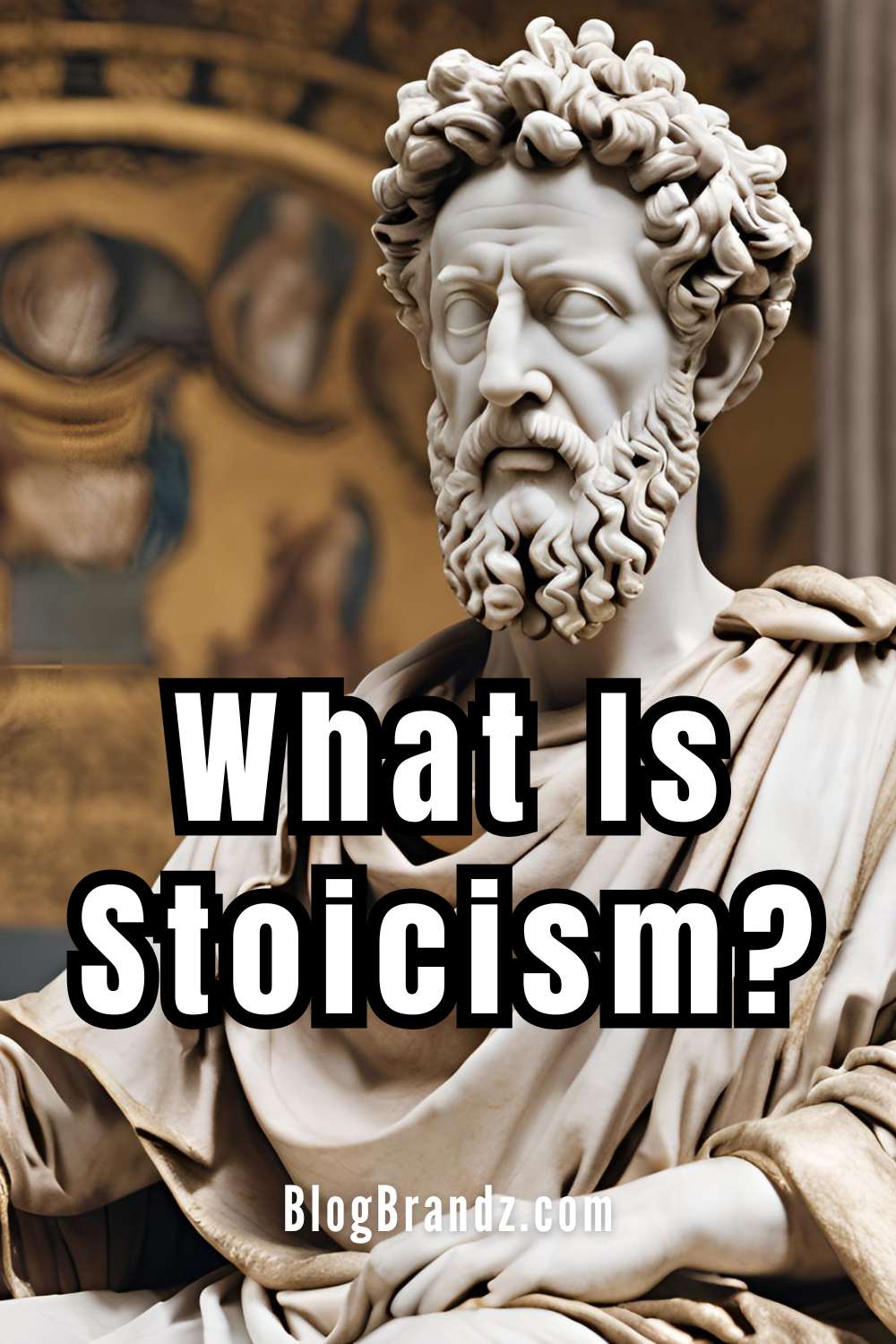
Discover how stoic philosophy, beliefs, and principles can help you tackle modern challenges with resilience and clarity.
After watching Gladiator II, I was captivated by Marcus Aurelius, not just as an emperor but as a philosopher. His presence in the original Gladiator movie had already piqued my interest, but the sequel reignited a desire to understand his teachings.
This led me to explore Marcus Aurelius’ stoicism and the timeless principles of stoicism philosophy, which provide tools to navigate life’s challenges with resilience and purpose. The more I delved into this topic, the more I realized its relevance to modern life.
In this article, I unpack the meaning of stoicism philosophy, stoic principles, and beliefs, with insights on how to practice stoicism to inspire your journey to resilience and clarity.
“You have power over your mind — not outside events. Realize this and you will find strength” ~ Marcus Aurelius
Get up to 50% off your MasterClass subscription
Contents
What Is Stoicism?
To start, what is stoicism? The ‘stoicism definition‘ can be summed up as a philosophy that focuses on virtue, rationality, and emotional resilience.
It encourages us to focus on what we can control — our thoughts, actions, and attitudes — while accepting what lies beyond our control, such as external events or others’ opinions.
Similarly, what does stoic mean? The ‘stoic meaning‘ encompasses traits like composure, endurance, and self-discipline. A common stoic synonym would be “steadfast” or “unflappable,” emphasizing resilience in the face of hardship.
A ‘stoic definition’ often refers to a person who remains calm in adversity, symbolized by the iconic stoic face or stoic expression that shows strength and resolve.
To define ‘stoic’ further, stoic philosophy centers around living virtuously according to reason and nature. Its four stoic virtues — wisdom, courage, justice, and temperance — serve as a moral compass for navigating life.
Stoic Philosophers & Their Beliefs
The Greek founder of stoicism, Zeno of Citium, established the philosophy in the early 3rd century BCE in Athens. Over centuries, notable stoic philosophers like Seneca, Epictetus, and Marcus Aurelius expanded their principles.
Their works, including Meditations by Marcus Aurelius and Letters from a Stoic by Seneca, remain foundational texts in stoicism books. Stoic philosophy encourages us to reflect on life’s transient nature and embrace challenges with a mindset rooted in stoic principles.
For example, Marcus Aurelius often meditated on the fleetingness of life, a concept tied to his belief in amor fati, or loving one’s fate. Stoic philosophy has even inspired fictional philosophers like Jedi Master Yoda from Star Wars.
Austrian neurologist and psychiatrist, Viktor Frankl’s philosophy aligns closely with Stoicism, particularly in his emphasis on finding meaning in suffering and taking responsibility for one’s response to adversity.
In his book Man’s Search for Meaning, Frankl argues that even in the most extreme circumstances, such as his experience in Nazi concentration camps, individuals can find purpose by choosing how to respond to their situation.
This mirrors the Stoic idea that while we cannot control external events, we have control over our thoughts and reactions. Both Frankl and the Stoics emphasize the power of inner freedom and self-mastery, suggesting that one’s attitude toward suffering can transform the experience itself.
Frankl’s idea of “tragic optimism” — finding meaning in life despite suffering — parallels the Stoic acceptance of hardship as an opportunity for growth and virtue. The focus is on maintaining inner peace, purpose, and resilience, regardless of external circumstances.
How to Practice Stoicism Principles
Applying stoicism principles in everyday life can help cultivate resilience, focus, and inner peace. Here’s how you can incorporate these practices step by step, along with real-life examples:
#1. Embrace the dichotomy of control
This Stoic principle reminds us to focus on what we can control and release concerns about what we cannot. Adopting this mindset frees you from unnecessary stress and frustration. For instance, the Serenity Prayer is a part of many 12-step programs for recovery from addiction.
“God, grant me the serenity to accept the things I cannot change, the courage to change the things I can, and the wisdom to know the difference.” ~ The Serenity Prayer
How to Practice:
- Example 1: Imagine you’re stuck in traffic and running late. Instead of spiraling into frustration, remind yourself that the traffic is beyond your control. Use the time to listen to a podcast or reflect on your day.
- Example 2: During a heated argument, focus on controlling your tone and words rather than attempting to change the other person’s perspective. Maintaining your composure is within your power; their reaction is not.
In the movie, Bridge of Spies, the Russian spy, Rudolf Abel, demonstrates a quintessentially stoic attitude when faced with imprisonment and uncertainty.
When Tom Hanks’ character, James Donovan, asks him why he doesn’t seem upset about his dire situation, Abel responds simply, “Will it help?” This response embodies a core principle of Stoicism: focusing on what is within one’s control and accepting what is not.
Abel’s calm demeanor reflects his understanding that worrying or lamenting over unchangeable circumstances only adds unnecessary suffering. His ability to remain composed and rational under pressure is a powerful example of Stoic resilience in the face of adversity.
#2. Cultivate stoic virtues
The four Stoic virtues — wisdom, courage, temperance, and justice — are the foundation of stoicism. Practicing them helps you live a virtuous and balanced life.
How to Practice:
- Wisdom: Before making a decision, pause and consider its long-term impact. For instance, avoid impulsive purchases by asking, “Does this align with my financial goals?”
- Courage: Stand up for what’s right, even when uncomfortable. For example, speak up against unfair treatment at work or support a friend facing criticism.
- Temperance: Practice moderation in your daily habits. Limit screen time in the evening to ensure quality sleep or opt for one indulgent treat instead of overindulging.
- Justice: Treat others fairly and kindly. This could mean volunteering for a cause, mentoring someone in need, or ensuring everyone’s voice is heard in a group discussion.
#3. Practice negative visualization
This involves imagining the worst-case scenarios in your life — not to dwell on fear, but to build gratitude and resilience while preparing yourself for the worst that can happen.
How to Practice:
- Example 1: Before a big presentation, envision technical difficulties or tough questions from the audience. Prepare for these scenarios by rehearsing without slides or brainstorming answers to challenging queries.
- Example 2: Consider losing something valuable, such as a cherished relationship or possession. This can deepen your appreciation for what you have and encourage you to cherish moments and people.
This Stoic principle was summed up perfectly in this quote by Jedi Master Yoda from Star Wars, when he told Anakin Skywalker, “Train yourself to let go of everything you fear to lose.” (advice that unfortunately came too late for Anakin).
“Train yourself to let go of everything you fear to lose.” ~ Jedi Master Yoda, Star Wars: Episode III – Revenge of the Sith.
#4. Engage in daily reflection
Reflection is a cornerstone of stoicism philosophy, helping you evaluate your actions and refine your mindset.
How to Practice:
- Example 1: At the start of your day, ask yourself, “What challenges might I face today, and how can I approach them virtuously?”
- Example 2: In the evening, use a journal (like The Daily Stoic Journal) to reflect on these questions:
- “What did I do well today?”
- “What could I have done better?”
- “Did I act in alignment with my values?”
#5. Embrace the long view
Another way to practice Stoicism is by adopting a “20,000-foot view,” stepping back to see the bigger picture rather than getting lost in immediate concerns. This perspective allows you to focus on what truly matters over time.
A helpful exercise is to ask yourself, “Will this matter in five years?” If the answer is no, it’s often not worth worrying about now. This practice aligns with the Stoic principle of prioritizing what is meaningful and letting go of trivial anxieties.
Taking an even longer view — considering how your actions might ripple across lifetimes — can deepen your response. This perspective, rooted in Stoicism, Buddhism, and Hindu philosophy, encourages mindfulness of the karma you create.
How to practice:
- Mindful Decision-Making: Before reacting, consider the long-term impact of your actions. Ask, “Will this decision create harmony or regret?” This helps you align with Stoic virtue and the principles of positive karma.
- Cultivating Compassion: When faced with frustration, choose empathy over anger. Responding with patience fosters peace and good karma, benefiting both yourself and others.
Every action, word, or thought has the potential to impact not only your current life but future ones as well. By focusing on the long-term consequences, you avoid impulsive reactions and choose actions that foster good karma, aligning with the Stoic ideal of living a life of virtue.
This approach grounds you in a sense of purpose, self-mastery, and an awareness of your role in the eternal flow of existence.
#6. Memorize stoic quotes
Stoicism quotes are quick reminders to stay grounded and focused on Stoic principles. They provide wisdom and strength during challenging moments.
How to Practice:
- Example 1: Write Stoic quotes and keep them visible, such as on your desk, wallpaper, or bathroom mirror. For instance, Marcus Aurelius’s stoic quote about control, “You have power over your mind—not outside events,” can help you maintain clarity under pressure.
- Example 2: Recite a favorite Stoic quote during moments of stress, such as Epictetus’ teaching: “It’s not what happens to you, but how you react to it that matters.” This can help you regain perspective during a tough day.
By incorporating these stoic expressions into your daily life, you can live a life aligned with these Stoicism beliefs and stoic virtues, finding strength, purpose, and peace in ordinary and extraordinary moments.
“It’s not what happens to you, but how you react to it that matters.” ~ Epictetus
Stoicism Beliefs & Its Relevance Today
In today’s fast-paced world, the principles of Stoicism philosophy provide a roadmap for tackling life’s challenges with grace and resilience. These stoicism beliefs about rationality, virtue, and emotional resilience remain profoundly relevant.
Stoicism and Christianity, as well as Hinduism, Buddhism, and many Eastern religions, share common ground, emphasizing virtues like humility, service, and acceptance of fate.
These parallels make Stoicism accessible to people from various belief systems, enriching their understanding of life’s challenges. As Ryan Holiday, author and host of The Daily Stoic podcast, emphasizes, ancient wisdom is uniquely equipped to address modern dilemmas.
By integrating its principles, we can navigate life’s uncertainties with clarity and purpose. For instance, Stoicism encourages self-control in moments of anger, offering an antidote to impulsive reactions.
Ryan Holiday’s MasterClass series, Using Ancient Wisdom to Solve Modern Problems, explores how timeless stoic strategies can improve communication, strengthen relationships, and build emotional resilience.
These Stoic principles will help you navigate uncertainty and adversity with clarity and purpose. Whether through journaling, a favorite Stoic quote, or cultivating virtues like courage and justice, Stoicism offers a practical framework for anyone looking to live with intention and balance.
As Ryan Holiday demonstrates, the lessons of Marcus Aurelius and other Stoic philosophers remain as relevant today as ever.
Get up to 50% off your MasterClass subscription
Stoicism Books: A Treasure Trove of Wisdom
If you’re intrigued by stoicism, reading the best books on stoicism is a great way to dive deeper. Start with these classics and modern guides:
Classic Stoicism Books:
Modern Books About Stoicism:
- The Daily Stoic by Ryan Holiday
- The Obstacle Is the Way by Ryan Holiday
- Man’s Search for Meaning by Viktor Frankl
These books about stoicism distill ancient wisdom into practical advice, making stoic philosophy accessible to today’s readers.
18 Daily Stoic Quotes for Mindful Living
Stoicism has gifted us timeless insights through Stoic quotes illuminating the path to self-mastery and resilience. These quotes serve as daily reminders of the strength within us, offering clarity on love, control, suffering, and life’s impermanence.
What is a powerful stoic quote that can help you change your perspective on life? Let’s explore the depth of these Stoicism quotes and their relevance to our daily lives:
- “You have power over your mind—not outside events. Realize this, and you will find strength.” ~ Marcus Aurelius
This stoic quote encapsulates the core of Stoic thought: control over the mind leads to true strength. - “First say to yourself what you would be, and then do what you have to do.” ~ Epictetus
This daily stoic quote encourages us to align intention with action for a purposeful life. - “Waste no more time arguing about what a good person should be. Be one.” ~ Marcus Aurelius
This is the best stoic quote to shift focus from theory to practice, urging us to embody virtue. - “He who fears death will never do anything worthy of a man who is alive.” ~ Seneca
This stoic quote on death challenges us to overcome fear and live fully. - “If you are distressed by anything external, the pain is not due to the thing itself but to your estimate of it; and this you have the power to revoke at any moment.” ~ Marcus Aurelius
This profound stoic quote about worry reminds us that perception, not circumstance, creates distress. - “We suffer more often in imagination than in reality.” ~ Seneca
This random stoic quote highlights how unnecessary fears intensify suffering. - “To love only what happens, what was destined. No greater harmony.” ~ Marcus Aurelius
This stoic quote on love emphasizes acceptance of fate as the highest form of harmony. - “Make the best use of what is in your power, and take the rest as it happens.” ~ Epictetus
This perspective stoic quote teaches us to focus on what we can influence while letting go of the rest. - “Difficulties strengthen the mind, as labor does the body.” ~ Seneca
This strength stoic quote shows how adversity builds resilience and fortitude. - “Think of yourself as dead. You have lived your life. Now, take what’s left and live it properly.” ~ Marcus Aurelius
This stark stoic quote about death urges us to seize the moment with newfound purpose. - “Man is disturbed not by things, but by the views he takes of them.” ~ Epictetus
This stoic quote about control reminds us that peace is achieved by managing our interpretation of events. - “It is not that we have a short time to live, but that we waste a lot of it.” ~ Seneca
This minimalist stoic quote challenges us to live meaningfully and prioritize what truly matters. - “Today I escaped anxiety. Or no, I discarded it, because it was within me, in my own perceptions — not outside.” ~ Marcus Aurelius
This daily stoic quote of the day offers liberation through a shift in mindset. - “The best revenge is not to be like your enemy.” ~ Marcus Aurelius
This powerful stoic quote about suffering emphasizes dignity and restraint over retaliation. - “Don’t explain your philosophy. Embody it.” ~ Epictetus
This stoic quote for today challenges us to live by example rather than through words. - “When we are no longer able to change a situation, we are challenged to change ourselves.” ~ Viktor Frankl
This stoic quote on control reflects the Stoic principle of focusing on what is within our control — our thoughts, attitudes, and responses — while accepting what we cannot change. - “Between stimulus and response, there is a space. In that space is our power to choose our response. In our response lies our growth and our freedom.” ~ Viktor Frankl
This mirrors the Stoic idea that we control our reactions to external events, a core tenet of Stoic philosophy. - “Life is never made unbearable by circumstances, but only by lack of meaning and purpose.” ~ Viktor Frankl
This stoic quote mirrors Stoic beliefs on the importance of purpose and how one’s inner strength, or meaning, determines how we face challenges.
Each of these quotes resonates with the principles of Stoicism, offering tools to navigate life’s challenges. Whether seeking a daily Stoic quote today or reflecting on the impermanence of life, these teachings inspire us to find strength, clarity, and purpose in every moment.
Stoicism for Everyday Resilience
Exploring Marcus Aurelius’ stoicism and the broader tenets of stoicism philosophy has given me a renewed perspective on life. The teachings from stoicism books and the timeless stoic quotes provide a roadmap for navigating challenges with courage and composure.
Whether you’re drawn to the Stoic meaning of composure or inspired by the Stoicism beliefs in virtuous living, this philosophy offers tools for personal growth.
As Marcus Aurelius famously said, “The happiness of your life depends upon the quality of your thoughts.” By embracing stoic principles, you can find strength in every situation and live purposefully — just as the great leaders of history did.
“The happiness of your life depends upon the quality of your thoughts.” ~ Marcus Aurelius
Here are some more MasterClasses to help you build resilience at work and in life:
- Robin Arzón MasterClass on Mental Strength
- Lewis Hamilton MasterClass on a Winning Mindset
- Critical Leadership Training with Navy SEAL Veteran Jocko Willink
- Jon Kabat-Zinn MasterClass on Mindfulness & Meditation
- Dr. Cornel West’s MasterClass on Philosophy & Critical Thinking
- Hillary Rodham Clinton MasterClass on the Power of Resilience
Success Tips & Tutorials
-
- How To Control Your Emotions, Be Resilient & Stay Calm Under Pressure
- 13 High-Stakes Communication Skills for Business Success
- How To Grow Your Personal Power & Live Your Life To The Fullest
- How To Reframe Limiting Beliefs from Scarcity to Abundance
- 10 Good Life Habits to Rewire Your Brain for Positivity and Success
- How To Improve Brain Power & Keep Your Mind Healthy
- 10 Emotional Self-Care Tips For Writers & Creatives
- 22 Activities to Find Your Purpose in Life
- How To Set Boundaries in Relationships
- How to Unlearn Toxic Behavior in The Workplace
- Top 10 Counterintuitive Rules Of Success In Life
- Get The Champion Mindset: To Be A Champion, Become A Child
- The Eightfold Fence: How To Create Your Inner Sanctuary
- What are the Key Leadership Skills to Develop in Future Leaders?
- How to Build Good Relationships as a Success-Driven Entrepreneur
- Become A Successful Person: 12 Success Habits of Successful People
© 2024, Priya Florence Shah. All rights reserved.
Priya Florence Shah is a bestselling author and an award-winning blogger. Check out her book on emotional self-care for women. Priya writes short stories and poetry and chills with her two-legged and four-legged kids in her spare time.
Discover more from Business & Branding Tips
Subscribe to get the latest posts sent to your email.


